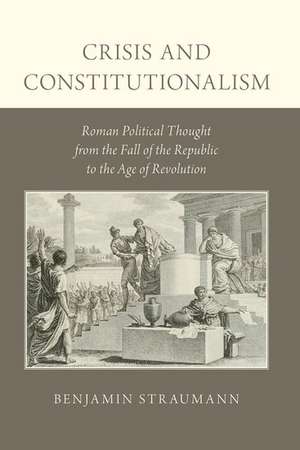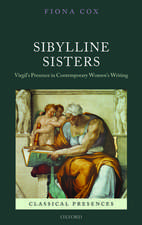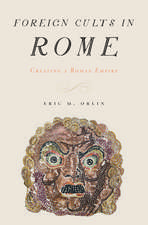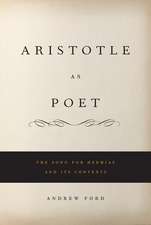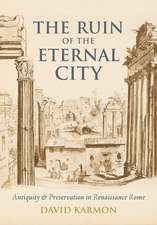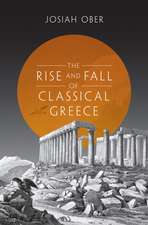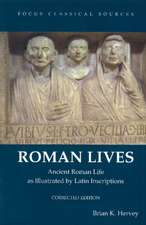Crisis and Constitutionalism: Roman Political Thought from the Fall of the Republic to the Age of Revolution
Autor Benjamin Straumannen Limba Engleză Paperback – 15 mar 2018
| Toate formatele și edițiile | Preț | Express |
|---|---|---|
| Paperback (1) | 309.83 lei 31-37 zile | |
| Oxford University Press – 15 mar 2018 | 309.83 lei 31-37 zile | |
| Hardback (1) | 704.31 lei 31-37 zile | |
| Oxford University Press – 14 apr 2016 | 704.31 lei 31-37 zile |
Preț: 309.83 lei
Preț vechi: 350.55 lei
-12% Nou
Puncte Express: 465
Preț estimativ în valută:
59.28€ • 62.07$ • 49.06£
59.28€ • 62.07$ • 49.06£
Carte tipărită la comandă
Livrare economică 25-31 martie
Preluare comenzi: 021 569.72.76
Specificații
ISBN-13: 9780190879532
ISBN-10: 019087953X
Pagini: 432
Dimensiuni: 229 x 147 x 33 mm
Greutate: 0.59 kg
Editura: Oxford University Press
Colecția OUP USA
Locul publicării:New York, United States
ISBN-10: 019087953X
Pagini: 432
Dimensiuni: 229 x 147 x 33 mm
Greutate: 0.59 kg
Editura: Oxford University Press
Colecția OUP USA
Locul publicării:New York, United States
Recenzii
Straumann's Crisis and Constitutionalism is an important contribution to a growing body of scholarship that is challenging conventional interpretations of Roman political thought [...] The work effectively both broadens and deepens our understanding of Roman political thought, challenging conventional interpretations and providing key insights into the final decades of the Roman republic.
This well-written book will be of interest to political theorists, classicists, and historians. ... Summing Up: Recommended. Graduate students and faculty.
a critical book to consult about Roman political and legal thought. It uncovers a Roman constitutional tradition and how that tradition was received in the medieval and early modern period.
Straumann has written a brilliant book [...] In Crisis and Constitutionalism, Straumann has challenged us to think much more deeply about constitutional theory and I look forward to discussing his arguments for years to come.
Important works on ancient Roman politics and law have also contributed to this Roman turn in the history of early-modern political thought. With this new work, Straumann positions himself at the forefront of this turn, and has produced a book that will speak to historians, jurists, political theorists, and philosophers alike. His erudition is towering, his analyses sharp and insightful, and he writes with clarity and occasional wit.
An important and welcome work on several levels. It offers learned interpretations of important political thinkers, including Cicero, Polybius, and Jean Bodin. The work transcends in importance any given interpretation of the thinkers it considers because it also engages in a scholarly debate, endeavouring to help correct what the author regards as a significant misunderstanding in the secondary literature that draws a strict distinction between 'classical republicanism' and liberalism ... An unusually learned and rich book.
In his ambitious and important book, Benjamin Straumann attributes the origins of constitutional thought in the European tradition to Cicero's writings of the fifties BC. He then traces the development of this thought through the Enlightenment to the debates that accompanied the ratification of the U.S. Constitution in the 1780s ... What sets Straumann's book apart ... is the depth of his argumentation about classical texts, his adroit reading of Marcus Tullius Cicero (106-43 BC), and his denial of 'constitutionalism' as a feature of the political thought of Plato or Aristotle.
Straumann succeeds in drawing attention to the legacy of Roman political thought, lending it an abiding importance for students of political institutions in any age.
learned, original, ambitious and important
The case for constitutional thought in Rome is a tricky one to make, but for all the pitfalls it is worth making. The change Rome underwent between the birth of Cicero and the death of Augustus was profound and irrevocable, and the question of whether the republic fell or was pushed to its death remains a perennial favorite at the end of surveys of republican history, and for good reason ... this book articulates much evidence pertinent to this complicated question, and offers a useful terminology with which to describe its components. Scholars looking for a selective survey of constitutional thought in classical and early modern Europe will likewise find much of value in it...the timing of Straumann's intervention could hardly have been better ... Crisis and Constitutionalism could refer to a remarkably wide range of developments across the globe, developments that attest to the continued relevance of Roman political thought today.
... it does not simply add to this recent renaissance. Instead, it fulfills it: It shows that the Romans were decidedly different from the Greeks, that this difference gives normative weight to the Romans, and that the Romans should be of far greater interest to political theorists than they have been for the last 100 years of largely Greek focused scholarship.
Why was Rome so important to political theorists beginning with Cicero right through to the American Founders? Because, Straumann insists, it was principally not traditional Roman virtue that inspired them, but a Republican constitutional order ... book with a scope so admirably broad in its historical sweep has to depend on its author's command of a formidable number of primary texts and the contemporaneous contexts in which they were written, as well as of a vast body of pertinent scholarship. Straumann's range of reference is indeed impressive ... Straumann's principal achievement in the book will prove to be his overall contribution in opening up a big question about what later generations really took to be so important about the Roman Republic. Crisis and Constitutionalism brings much learning and intelligence to that project. There can be few scholars interested in the theme who will not find stimulus and illumination in it.
It is very rare to find someone talking about Ciceronian theory actually looking at historical events and Ciceronian speeches. It is a pleasure to have Cicero taken seriously as a political thinker without incessant nods to Greek models, and yet Straumann's dissection of Greek political theory ... is very enjoyable. And it is welcome to see constitutionalism making a return to Roman history. Straumann twice quotes Syme's sneer that the Roman constitution was "a screen and a sham" (The Roman Revolution [Oxford 1939] 15); he might also have quoted Syme's dismissal of constitutional interpretation: "What is commonly called the 'Rechtsfrage,' and interminably discussed, depends upon a 'Machtfrage'" (48n.). Straumann is instead a reader of Mommsen although clearly rejecting the great man's denigration of Cicero. This is an outstanding book: learned, intelligent, careful, and ambitious. I have learned a great deal from it.
During the several months during which I slowly and carefully read (and briefly summarized for myself) Straumann's work, political events in both my country and in the approach to the US Presidential elections were illuminated for me by what I was learning from Straumann's lucid exposition of what a constitution is and what it does, and what happens when it is not adhered to...His background as both lawyer and educator shows in his meticulous legal argumentation and his carefully didactic reiteration of key points in that argument, which make for easy navigation by a less informed readership...it has been a pleasure for this reader metaphorically to sit at the feet of a master of constitutional studies.
However, the wider implications of Straumann's original, beautifully crafted and exceptionally erudite exploration of Roman political thought are, I think, nicely brought out by considering how an argument about classical thought and institutions may bear on our contemporary concerns and debates. In particular, Straumann brings to the surface an idea of political community as a "jural" community, which he had explored in his first, equally impressive book, which dealt with the natural law theory of Hugo Grotius (1583-1645).
With an impressive and wide-ranging triple grip on the ancient sources, early modern reception, and much more recent scholarship, Benjamin Straumann has lucidly reconstructed for us the Roman debate about emergency powers -- above all concerning the dictatorship, extraordinary commands, and the question of limits to the citizen's right of appeal -- in order to show how the long tradition of political reflection on the fall of the Republic, which stretches back to Cicero himself, eventually came to animate a great deal of modern constitutionalism.
For Straumann, the constitution was at the heart of the crisis of the late Roman Republic, and this was strongly reflected in later political theory. This novel and adventurous thesis mounts a refreshing challenge to current orthodoxies, and will provoke constructive debate among historians and political theorists alike.
Crisis and Constitutionalism is a brilliantly original and erudite argument in favor of the distinctiveness and long-term importance of Roman constitutional thought from Cicero to the American Founders, which demonstrates just how much Western political and legal thought, on both sides of the Atlantic, has owed, and still owes, to ancient Rome. It is controversial, highly compelling, and of very real contemporary significance.
This well-written book will be of interest to political theorists, classicists, and historians. ... Summing Up: Recommended. Graduate students and faculty.
a critical book to consult about Roman political and legal thought. It uncovers a Roman constitutional tradition and how that tradition was received in the medieval and early modern period.
Straumann has written a brilliant book [...] In Crisis and Constitutionalism, Straumann has challenged us to think much more deeply about constitutional theory and I look forward to discussing his arguments for years to come.
Important works on ancient Roman politics and law have also contributed to this Roman turn in the history of early-modern political thought. With this new work, Straumann positions himself at the forefront of this turn, and has produced a book that will speak to historians, jurists, political theorists, and philosophers alike. His erudition is towering, his analyses sharp and insightful, and he writes with clarity and occasional wit.
An important and welcome work on several levels. It offers learned interpretations of important political thinkers, including Cicero, Polybius, and Jean Bodin. The work transcends in importance any given interpretation of the thinkers it considers because it also engages in a scholarly debate, endeavouring to help correct what the author regards as a significant misunderstanding in the secondary literature that draws a strict distinction between 'classical republicanism' and liberalism ... An unusually learned and rich book.
In his ambitious and important book, Benjamin Straumann attributes the origins of constitutional thought in the European tradition to Cicero's writings of the fifties BC. He then traces the development of this thought through the Enlightenment to the debates that accompanied the ratification of the U.S. Constitution in the 1780s ... What sets Straumann's book apart ... is the depth of his argumentation about classical texts, his adroit reading of Marcus Tullius Cicero (106-43 BC), and his denial of 'constitutionalism' as a feature of the political thought of Plato or Aristotle.
Straumann succeeds in drawing attention to the legacy of Roman political thought, lending it an abiding importance for students of political institutions in any age.
learned, original, ambitious and important
The case for constitutional thought in Rome is a tricky one to make, but for all the pitfalls it is worth making. The change Rome underwent between the birth of Cicero and the death of Augustus was profound and irrevocable, and the question of whether the republic fell or was pushed to its death remains a perennial favorite at the end of surveys of republican history, and for good reason ... this book articulates much evidence pertinent to this complicated question, and offers a useful terminology with which to describe its components. Scholars looking for a selective survey of constitutional thought in classical and early modern Europe will likewise find much of value in it...the timing of Straumann's intervention could hardly have been better ... Crisis and Constitutionalism could refer to a remarkably wide range of developments across the globe, developments that attest to the continued relevance of Roman political thought today.
... it does not simply add to this recent renaissance. Instead, it fulfills it: It shows that the Romans were decidedly different from the Greeks, that this difference gives normative weight to the Romans, and that the Romans should be of far greater interest to political theorists than they have been for the last 100 years of largely Greek focused scholarship.
Why was Rome so important to political theorists beginning with Cicero right through to the American Founders? Because, Straumann insists, it was principally not traditional Roman virtue that inspired them, but a Republican constitutional order ... book with a scope so admirably broad in its historical sweep has to depend on its author's command of a formidable number of primary texts and the contemporaneous contexts in which they were written, as well as of a vast body of pertinent scholarship. Straumann's range of reference is indeed impressive ... Straumann's principal achievement in the book will prove to be his overall contribution in opening up a big question about what later generations really took to be so important about the Roman Republic. Crisis and Constitutionalism brings much learning and intelligence to that project. There can be few scholars interested in the theme who will not find stimulus and illumination in it.
It is very rare to find someone talking about Ciceronian theory actually looking at historical events and Ciceronian speeches. It is a pleasure to have Cicero taken seriously as a political thinker without incessant nods to Greek models, and yet Straumann's dissection of Greek political theory ... is very enjoyable. And it is welcome to see constitutionalism making a return to Roman history. Straumann twice quotes Syme's sneer that the Roman constitution was "a screen and a sham" (The Roman Revolution [Oxford 1939] 15); he might also have quoted Syme's dismissal of constitutional interpretation: "What is commonly called the 'Rechtsfrage,' and interminably discussed, depends upon a 'Machtfrage'" (48n.). Straumann is instead a reader of Mommsen although clearly rejecting the great man's denigration of Cicero. This is an outstanding book: learned, intelligent, careful, and ambitious. I have learned a great deal from it.
During the several months during which I slowly and carefully read (and briefly summarized for myself) Straumann's work, political events in both my country and in the approach to the US Presidential elections were illuminated for me by what I was learning from Straumann's lucid exposition of what a constitution is and what it does, and what happens when it is not adhered to...His background as both lawyer and educator shows in his meticulous legal argumentation and his carefully didactic reiteration of key points in that argument, which make for easy navigation by a less informed readership...it has been a pleasure for this reader metaphorically to sit at the feet of a master of constitutional studies.
However, the wider implications of Straumann's original, beautifully crafted and exceptionally erudite exploration of Roman political thought are, I think, nicely brought out by considering how an argument about classical thought and institutions may bear on our contemporary concerns and debates. In particular, Straumann brings to the surface an idea of political community as a "jural" community, which he had explored in his first, equally impressive book, which dealt with the natural law theory of Hugo Grotius (1583-1645).
With an impressive and wide-ranging triple grip on the ancient sources, early modern reception, and much more recent scholarship, Benjamin Straumann has lucidly reconstructed for us the Roman debate about emergency powers -- above all concerning the dictatorship, extraordinary commands, and the question of limits to the citizen's right of appeal -- in order to show how the long tradition of political reflection on the fall of the Republic, which stretches back to Cicero himself, eventually came to animate a great deal of modern constitutionalism.
For Straumann, the constitution was at the heart of the crisis of the late Roman Republic, and this was strongly reflected in later political theory. This novel and adventurous thesis mounts a refreshing challenge to current orthodoxies, and will provoke constructive debate among historians and political theorists alike.
Crisis and Constitutionalism is a brilliantly original and erudite argument in favor of the distinctiveness and long-term importance of Roman constitutional thought from Cicero to the American Founders, which demonstrates just how much Western political and legal thought, on both sides of the Atlantic, has owed, and still owes, to ancient Rome. It is controversial, highly compelling, and of very real contemporary significance.
Notă biografică
Benjamin Straumann is Alberico Gentili Senior Fellow at New York University School of Law and Lecturer at the University of Zurich. He is the author of Roman Law in the State of Nature and co-editor of the book series The History and Theory of International Law.
